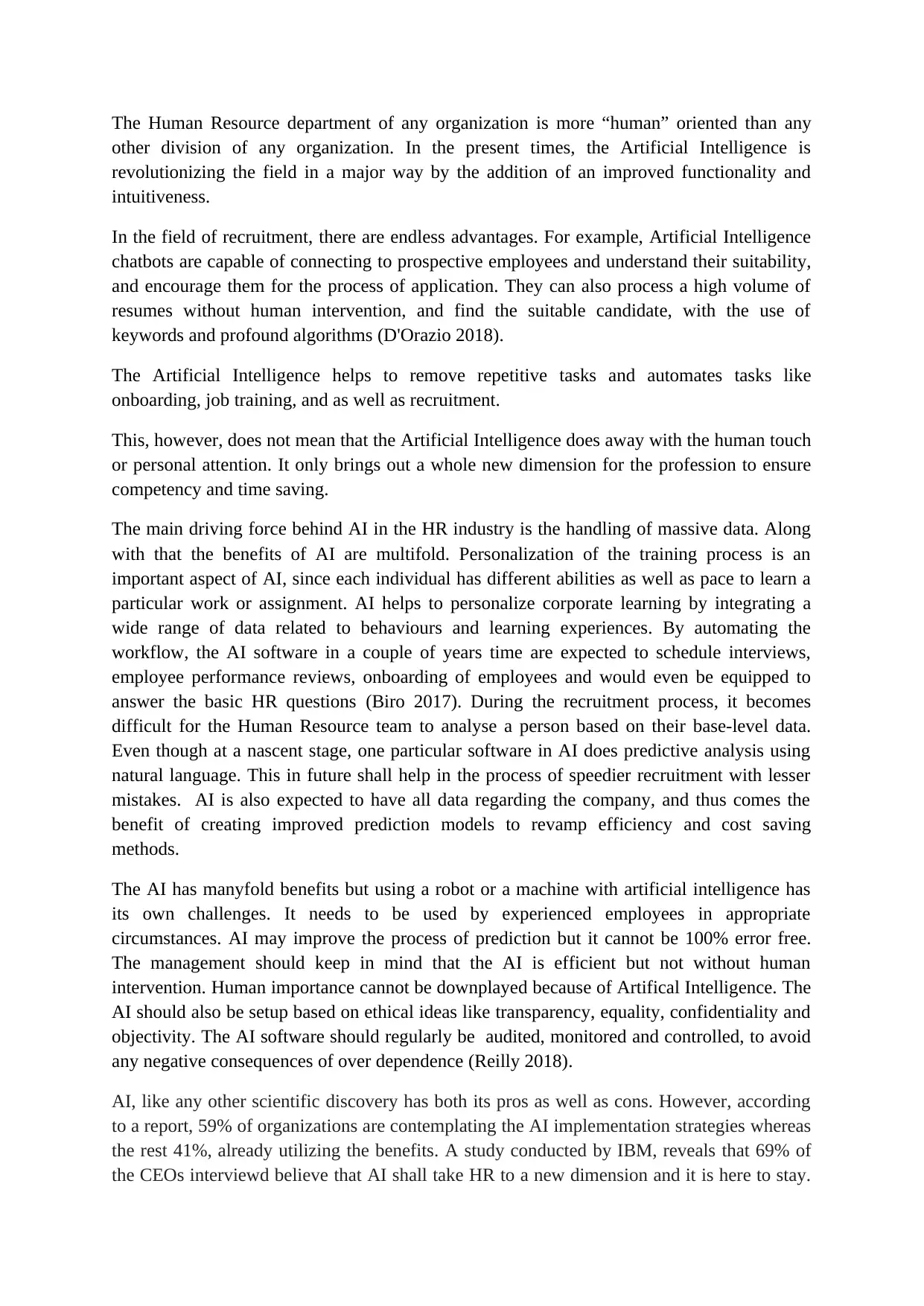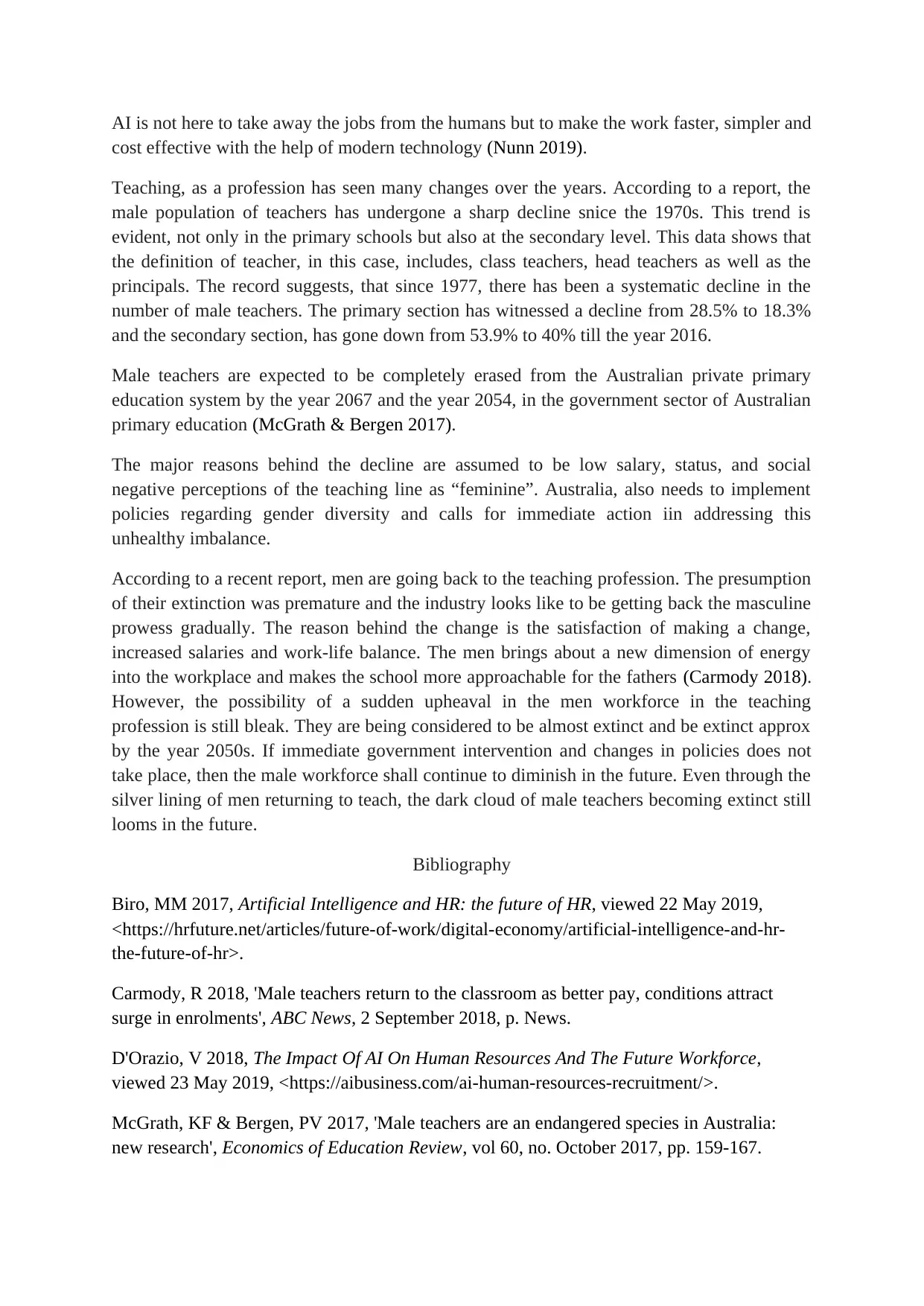The Role of AI in HR and Gender Imbalance in the Teaching Profession
VerifiedAdded on 2022/10/31
|3
|1179
|487
Report
AI Summary
This report delves into the transformative impact of Artificial Intelligence (AI) on the Human Resource (HR) department, highlighting its advantages in recruitment, automation of tasks, and personalized training. It emphasizes the importance of ethical considerations and human oversight in AI implementation. Furthermore, the report examines the decline of male teachers in the Australian education system, exploring potential causes such as low salaries and societal perceptions, and the need for policies to address gender imbalance. While acknowledging a recent increase in male teachers, the report underscores the challenges and the need for immediate interventions to ensure gender diversity. The report also provides a comprehensive analysis of the benefits and challenges of AI in HR and the teaching profession.

The Human Resource department of any organization is more “human” oriented than any
other division of any organization. In the present times, the Artificial Intelligence is
revolutionizing the field in a major way by the addition of an improved functionality and
intuitiveness.
In the field of recruitment, there are endless advantages. For example, Artificial Intelligence
chatbots are capable of connecting to prospective employees and understand their suitability,
and encourage them for the process of application. They can also process a high volume of
resumes without human intervention, and find the suitable candidate, with the use of
keywords and profound algorithms (D'Orazio 2018).
The Artificial Intelligence helps to remove repetitive tasks and automates tasks like
onboarding, job training, and as well as recruitment.
This, however, does not mean that the Artificial Intelligence does away with the human touch
or personal attention. It only brings out a whole new dimension for the profession to ensure
competency and time saving.
The main driving force behind AI in the HR industry is the handling of massive data. Along
with that the benefits of AI are multifold. Personalization of the training process is an
important aspect of AI, since each individual has different abilities as well as pace to learn a
particular work or assignment. AI helps to personalize corporate learning by integrating a
wide range of data related to behaviours and learning experiences. By automating the
workflow, the AI software in a couple of years time are expected to schedule interviews,
employee performance reviews, onboarding of employees and would even be equipped to
answer the basic HR questions (Biro 2017). During the recruitment process, it becomes
difficult for the Human Resource team to analyse a person based on their base-level data.
Even though at a nascent stage, one particular software in AI does predictive analysis using
natural language. This in future shall help in the process of speedier recruitment with lesser
mistakes. AI is also expected to have all data regarding the company, and thus comes the
benefit of creating improved prediction models to revamp efficiency and cost saving
methods.
The AI has manyfold benefits but using a robot or a machine with artificial intelligence has
its own challenges. It needs to be used by experienced employees in appropriate
circumstances. AI may improve the process of prediction but it cannot be 100% error free.
The management should keep in mind that the AI is efficient but not without human
intervention. Human importance cannot be downplayed because of Artifical Intelligence. The
AI should also be setup based on ethical ideas like transparency, equality, confidentiality and
objectivity. The AI software should regularly be audited, monitored and controlled, to avoid
any negative consequences of over dependence (Reilly 2018).
AI, like any other scientific discovery has both its pros as well as cons. However, according
to a report, 59% of organizations are contemplating the AI implementation strategies whereas
the rest 41%, already utilizing the benefits. A study conducted by IBM, reveals that 69% of
the CEOs interviewd believe that AI shall take HR to a new dimension and it is here to stay.
other division of any organization. In the present times, the Artificial Intelligence is
revolutionizing the field in a major way by the addition of an improved functionality and
intuitiveness.
In the field of recruitment, there are endless advantages. For example, Artificial Intelligence
chatbots are capable of connecting to prospective employees and understand their suitability,
and encourage them for the process of application. They can also process a high volume of
resumes without human intervention, and find the suitable candidate, with the use of
keywords and profound algorithms (D'Orazio 2018).
The Artificial Intelligence helps to remove repetitive tasks and automates tasks like
onboarding, job training, and as well as recruitment.
This, however, does not mean that the Artificial Intelligence does away with the human touch
or personal attention. It only brings out a whole new dimension for the profession to ensure
competency and time saving.
The main driving force behind AI in the HR industry is the handling of massive data. Along
with that the benefits of AI are multifold. Personalization of the training process is an
important aspect of AI, since each individual has different abilities as well as pace to learn a
particular work or assignment. AI helps to personalize corporate learning by integrating a
wide range of data related to behaviours and learning experiences. By automating the
workflow, the AI software in a couple of years time are expected to schedule interviews,
employee performance reviews, onboarding of employees and would even be equipped to
answer the basic HR questions (Biro 2017). During the recruitment process, it becomes
difficult for the Human Resource team to analyse a person based on their base-level data.
Even though at a nascent stage, one particular software in AI does predictive analysis using
natural language. This in future shall help in the process of speedier recruitment with lesser
mistakes. AI is also expected to have all data regarding the company, and thus comes the
benefit of creating improved prediction models to revamp efficiency and cost saving
methods.
The AI has manyfold benefits but using a robot or a machine with artificial intelligence has
its own challenges. It needs to be used by experienced employees in appropriate
circumstances. AI may improve the process of prediction but it cannot be 100% error free.
The management should keep in mind that the AI is efficient but not without human
intervention. Human importance cannot be downplayed because of Artifical Intelligence. The
AI should also be setup based on ethical ideas like transparency, equality, confidentiality and
objectivity. The AI software should regularly be audited, monitored and controlled, to avoid
any negative consequences of over dependence (Reilly 2018).
AI, like any other scientific discovery has both its pros as well as cons. However, according
to a report, 59% of organizations are contemplating the AI implementation strategies whereas
the rest 41%, already utilizing the benefits. A study conducted by IBM, reveals that 69% of
the CEOs interviewd believe that AI shall take HR to a new dimension and it is here to stay.
Paraphrase This Document
Need a fresh take? Get an instant paraphrase of this document with our AI Paraphraser

AI is not here to take away the jobs from the humans but to make the work faster, simpler and
cost effective with the help of modern technology (Nunn 2019).
Teaching, as a profession has seen many changes over the years. According to a report, the
male population of teachers has undergone a sharp decline snice the 1970s. This trend is
evident, not only in the primary schools but also at the secondary level. This data shows that
the definition of teacher, in this case, includes, class teachers, head teachers as well as the
principals. The record suggests, that since 1977, there has been a systematic decline in the
number of male teachers. The primary section has witnessed a decline from 28.5% to 18.3%
and the secondary section, has gone down from 53.9% to 40% till the year 2016.
Male teachers are expected to be completely erased from the Australian private primary
education system by the year 2067 and the year 2054, in the government sector of Australian
primary education (McGrath & Bergen 2017).
The major reasons behind the decline are assumed to be low salary, status, and social
negative perceptions of the teaching line as “feminine”. Australia, also needs to implement
policies regarding gender diversity and calls for immediate action iin addressing this
unhealthy imbalance.
According to a recent report, men are going back to the teaching profession. The presumption
of their extinction was premature and the industry looks like to be getting back the masculine
prowess gradually. The reason behind the change is the satisfaction of making a change,
increased salaries and work-life balance. The men brings about a new dimension of energy
into the workplace and makes the school more approachable for the fathers (Carmody 2018).
However, the possibility of a sudden upheaval in the men workforce in the teaching
profession is still bleak. They are being considered to be almost extinct and be extinct approx
by the year 2050s. If immediate government intervention and changes in policies does not
take place, then the male workforce shall continue to diminish in the future. Even through the
silver lining of men returning to teach, the dark cloud of male teachers becoming extinct still
looms in the future.
Bibliography
Biro, MM 2017, Artificial Intelligence and HR: the future of HR, viewed 22 May 2019,
<https://hrfuture.net/articles/future-of-work/digital-economy/artificial-intelligence-and-hr-
the-future-of-hr>.
Carmody, R 2018, 'Male teachers return to the classroom as better pay, conditions attract
surge in enrolments', ABC News, 2 September 2018, p. News.
D'Orazio, V 2018, The Impact Of AI On Human Resources And The Future Workforce,
viewed 23 May 2019, <https://aibusiness.com/ai-human-resources-recruitment/>.
McGrath, KF & Bergen, PV 2017, 'Male teachers are an endangered species in Australia:
new research', Economics of Education Review, vol 60, no. October 2017, pp. 159-167.
cost effective with the help of modern technology (Nunn 2019).
Teaching, as a profession has seen many changes over the years. According to a report, the
male population of teachers has undergone a sharp decline snice the 1970s. This trend is
evident, not only in the primary schools but also at the secondary level. This data shows that
the definition of teacher, in this case, includes, class teachers, head teachers as well as the
principals. The record suggests, that since 1977, there has been a systematic decline in the
number of male teachers. The primary section has witnessed a decline from 28.5% to 18.3%
and the secondary section, has gone down from 53.9% to 40% till the year 2016.
Male teachers are expected to be completely erased from the Australian private primary
education system by the year 2067 and the year 2054, in the government sector of Australian
primary education (McGrath & Bergen 2017).
The major reasons behind the decline are assumed to be low salary, status, and social
negative perceptions of the teaching line as “feminine”. Australia, also needs to implement
policies regarding gender diversity and calls for immediate action iin addressing this
unhealthy imbalance.
According to a recent report, men are going back to the teaching profession. The presumption
of their extinction was premature and the industry looks like to be getting back the masculine
prowess gradually. The reason behind the change is the satisfaction of making a change,
increased salaries and work-life balance. The men brings about a new dimension of energy
into the workplace and makes the school more approachable for the fathers (Carmody 2018).
However, the possibility of a sudden upheaval in the men workforce in the teaching
profession is still bleak. They are being considered to be almost extinct and be extinct approx
by the year 2050s. If immediate government intervention and changes in policies does not
take place, then the male workforce shall continue to diminish in the future. Even through the
silver lining of men returning to teach, the dark cloud of male teachers becoming extinct still
looms in the future.
Bibliography
Biro, MM 2017, Artificial Intelligence and HR: the future of HR, viewed 22 May 2019,
<https://hrfuture.net/articles/future-of-work/digital-economy/artificial-intelligence-and-hr-
the-future-of-hr>.
Carmody, R 2018, 'Male teachers return to the classroom as better pay, conditions attract
surge in enrolments', ABC News, 2 September 2018, p. News.
D'Orazio, V 2018, The Impact Of AI On Human Resources And The Future Workforce,
viewed 23 May 2019, <https://aibusiness.com/ai-human-resources-recruitment/>.
McGrath, KF & Bergen, PV 2017, 'Male teachers are an endangered species in Australia:
new research', Economics of Education Review, vol 60, no. October 2017, pp. 159-167.

Nunn, DJ 2019, 'The Emerging Impact Of AI On HR', Forbes, 6 February 2019, p.
Innovation.
Reilly, P 2018, 'The impact of artificial intelligence on the HR function ', IES Perspectives on
HR, vol November 2018, pp. 7-11.
Innovation.
Reilly, P 2018, 'The impact of artificial intelligence on the HR function ', IES Perspectives on
HR, vol November 2018, pp. 7-11.
⊘ This is a preview!⊘
Do you want full access?
Subscribe today to unlock all pages.

Trusted by 1+ million students worldwide
1 out of 3
Related Documents
Your All-in-One AI-Powered Toolkit for Academic Success.
+13062052269
info@desklib.com
Available 24*7 on WhatsApp / Email
![[object Object]](/_next/static/media/star-bottom.7253800d.svg)
Unlock your academic potential
Copyright © 2020–2026 A2Z Services. All Rights Reserved. Developed and managed by ZUCOL.



